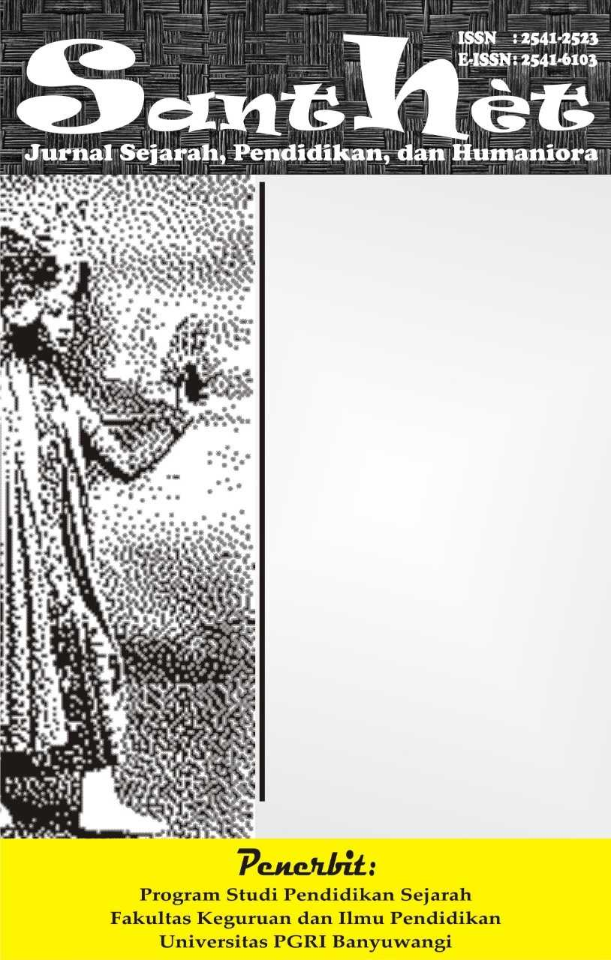Budaya “Ewuh Pakewuh”, Kecurangan, dan Sistem Whistleblowing: Perspektif Psikologi dan Budaya Berdasarkan Teori Perilaku Terencana
DOI:
https://doi.org/10.36526/santhet.v8i2.4092Keywords:
”ewuh pakewuh”, fraud, whistleblowing, theory planned behaviorAbstract
The results of the fraud survey in Indonesia in 2019 show that out of 239 cases of fraud found, 167 cases (69.9%) were related to corruption. Three conditions trigger fraud: pressure, opportunity, and rationalization. Fraud has a harmful impact, whether financial or non-financial, and therefore prevention efforts are needed such as implementating a whistleblowing system. Cultural factors significantly impact the effectiveness of such systems. This study explores the "ewuh pakewuh" culture through the lens of the theory of planned behavior (TPB). When reviewing the three determinants in the TPB, namely attitude toward the behavior, subjective norms, and perceived behavioral control, the "ewuh pakewuh" culture influences the intention of fraud behavior and the whistleblowing system. Literature studies reveal that in cultures with high "ewuh pakewuh" presence, fraud intention is high, and whistleblowing effectiveness is low. Although "ewuh pakewuh" fosters harmony and reduces conflict, courage is needed to report illegal actions for organizational sustainability. Research on "ewuh pakewuh" is more common in government settings, as it is believed to be more prevalent in government institutions than in egalitarian corporate organizations. Further research is necessary to understand this phenomenon and to evaluate how private companies in Indonesia are affected by the "ewuh pakewuh" culture and its impact on their performance.
References
Ajzen, I. (1991). The Theory Planned Behavior. Organizational Behavior and Human Deci-sion Processes. 50: 179-211.
Fatmawati, R. (2016). Budaya Birokrasi Ewuh pakewuh dan Kecurangan Akuntansi di Pemerintahan: Persepsi Aparat Pengawas Internal Pemerintah (APIP) Inspektorat Kabupaten Sragen. Aktual, 2(1), 20-33.
Frinaldi, A., & Embi, M. A. (2014). Budaya Kerja Ewuh pakewuh Di Kalangan Pegawai Negeri Sipil Etnik Jawa (Studi Pada Kabupaten Pasaman Barat, Provinsi Sumatera Barat). Humanus: Jurnal Ilmiah Ilmu-Ilmu Humaniora, 13(1), 68–75.
Kuncara W., A., Furqorina, R., & Payamta. (2017). Determinants of Internal Whistleblowing Intentions in Public Sector: Evidence from Indonesia. SHS Web of Conferences, 34, 01002. https://doi.org/10.1051/shsconf/20173401002
Larasati, RD. (2022). BAB II. http://repository.iainkudus.ac
Malle, S. S., Alimudidin, A., & Nirwana, N. (2019). Dilema Independensi Auditor Satuan Pengawasan Internal Perguruan Tinggi: Studi Fenomenologi. Media Riset Akuntansi, Auditing & Informasi, 19(1), 111–128.
Martín-Martín, A., Orduña-Malea, E., Harzing, A.-W., & López-Cózar, E. D. (2017). Can we use Google Scholar to identify highly-cited documents? Journal of Informetrics, 11(1), 152–163.
Meilina, R., & Soedjoko, D. H. (2019). The Implication of “Ewuh pakewuh” Cultural in OCB Implementation of Service Employee at Pesantren Sub District of Kediri City. Proceedings of the 1st Asian Conference on Humanities, Industry, and Technology for Society, ACHITS 2019, 30-31 July 2019, Surabaya, Indonesia.
Near, J. P., & Miceli, M. P. (1995). Effective Whistle-Blowing. The Academy of Management Review, 20(3), 679¬-708. https://doi.org/10.2307/258791
Pautasso, M. (2019). The structure and conduct of a narrative literature review. A guide to the scientific career: Virtues, communication, research and academic writing, 299-310.
Rahim, F., & Mutaqqin, D. (2023). Ewuh pakewuh as a culture in Java society: A psychological study. International Conference on Indigenous Psychology and Culture, 2023, Yogyakarta
Rozai, M. A. (2019). Perspektif independensi dan budaya Jawa “Ewuh pakewuh” terhadap kinerja aparat pengawas internal pemerintah (Apip) di Solo Raya. Assets: Jurnal Ekonomi, Manajemen, Dan Akuntansi, 9(2), 98–111.
Sari, M. M. R., Sustriani, P. N., & Suprasto, H. B. (2023). Can the Effectiveness of The Whistleblowing System and Ewuh pakewuh Culture Influence Fraud Disclosure. Jurnal Ilmiah Akuntansi Dan Bisnis, 18 (1), 134–146.
Soeharjono, H. I. (2011). Pengaruh Budaya Birokrasi “ewuh-pakewuh” Terhadap Efektivitas Sistem Pengendalian Intern. Jurnal Ilmu Administrasi: Media Pengembangan Ilmu Dan Praktek Administrasi, 8(3), 243-260.
Suseno, F.M. (1984). Etika Jawa, Sebuah Analisa Falsafi tentang Kebijaksanaan Hidup Jawa. Jakarta: PT Gramedia.
Suyatno, B., Armstrong, A. F., & Thomas, K. (2017). Barriers to whistleblowing intentions and reporting channel preferences. Economic and Social Development: Book of Proceedings, 115.
Tobing, D. H. (2010). Asertivitas Perokok Pasif dalam Busaya Ewuh pakewuh. Thesis: Program Magister Psikologi Fakultas Psikologi. https://repository.ugm.ac.id/id/eprint/84649 Universitas Gadjah Mada.
Tondok, M. S., Ardiansyah, F., & Ayuni (2012) Intensi kepatuhan menggunakan helm pada pengendara sepeda motor: Aplikasi teori perilaku terencana. Jurnal Sains Psikologi, 2(2), 96-112.
Wibowo, S. A., Ramli, A. H., & Nukman, I. (2016). Pengaruh Kohesivitas Kelompok Dan Ewuh pakewuh terhadap Pemberian Teguran Atasan kepada Bawahan. Psikoislamika: Jurnal Psikologi Dan Psikologi Islam, 13(1), 19–28.
Widagdo, A. K. (2016). Pengaruh Independensi dan Budaya Ewuh pakewuh Terhadap Efektivitas Audit Internal Pemerintah. Seminar Nasional dan The 3rd Call for Syariah Paper https://publikasiilmiah.ums.ac.id/xmlui/handle/11617/7320





























